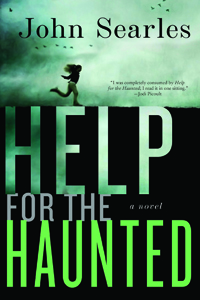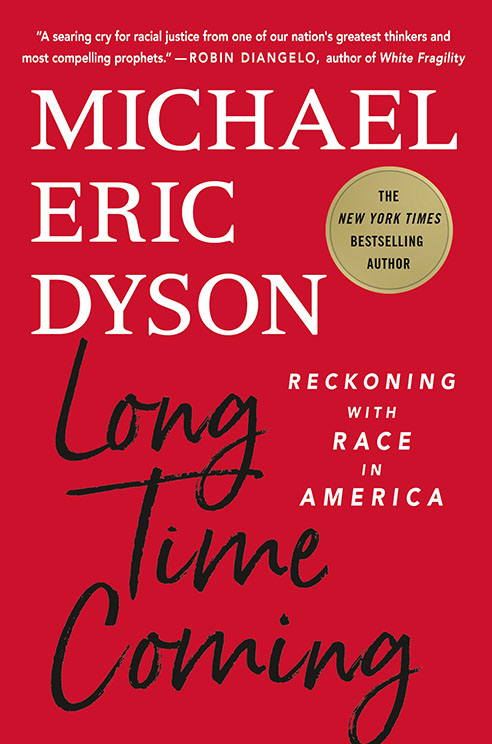Pursuing Ghosts
John Searles’s Help for the Haunted features a teen determined to solve the mystery of her parents’ murders
“If there is such a thing as putting away a memory until later, that is what I did,” says Sylvie Mason, describing the months following her parents’ unsolved double homicide. Sleeping in the back seat of her family’s Datsun, the thirteen-year-old narrator of John Searles’s unrelentingly gripping third novel, Help for the Haunted, awakes to the sound of gunshots being fired inside the nearby church. Her parents were there to meet their runaway daughter, Rose, who had called to ask them to meet her at the church. After their parents’ deaths, nineteen-year-old Rose is appointed Sylvie’s legal guardian, a role for which she’s woefully unprepared. Manipulative and prickly, Rose wants to bury the past as much as Sylvie needs to know the truth about what happened that night—even if it kills her.
 Sylvie’s parents worked as demonologists, claiming to have an innate ability to communicate with ghosts. Help for the Haunted takes its title from a fictional nonfiction book about their infamous career. “Ordinary was the last thing we were,” reflects Sylvie, who never shared her sister’s disdain for their parents’ calling. “I felt no tug-of-war between believing and not believing. I simply believed.” Consequently, she is the favored child: “You’re our good daughter,” her father says. “The one we rely on and trust to do what we need.”
Sylvie’s parents worked as demonologists, claiming to have an innate ability to communicate with ghosts. Help for the Haunted takes its title from a fictional nonfiction book about their infamous career. “Ordinary was the last thing we were,” reflects Sylvie, who never shared her sister’s disdain for their parents’ calling. “I felt no tug-of-war between believing and not believing. I simply believed.” Consequently, she is the favored child: “You’re our good daughter,” her father says. “The one we rely on and trust to do what we need.”
Unsurprisingly, given her history—which Sylvie records in terrifying detail—Rose makes for a terrible guardian. She flirts with Sylvie’s female caseworker, for example, and spends money on herself extravagantly while feeding Sylvie only Popsicles. At the urging of a police detective investigating the murder, Sylvie tries to consider her cruel sister through the lens of Sharon Olds’s poem “Little Things”: “I learned to love the little things about Rose, because of all the big things I could not love, no one could, it would be wrong to.” In a journal she’s kept since losing her parents, Sylvie records a scant list of these so-called little things, which includes “My sister is my sister. She thinks that’s reason enough for me to love her. And I guess I do too.”
 Unaware that Rose wasn’t home when the murders occurred, detectives pressure Sylvie into identifying the murderer as Albert Lynch, her parents’ former client, but their case against him falls apart when multiple witnesses corroborate his alibi. The police give Sylvie sixty-six hours either to recant her statement naming Lynch as the murderer or to tell them everything she knows. The difficulty is that Sylvie isn’t ready to admit what she knows, even to herself, and she doesn’t have all the necessary information. In a race to meet the deadline, she follows a trail of clues that leads her to assorted people from her parents’ past.
Unaware that Rose wasn’t home when the murders occurred, detectives pressure Sylvie into identifying the murderer as Albert Lynch, her parents’ former client, but their case against him falls apart when multiple witnesses corroborate his alibi. The police give Sylvie sixty-six hours either to recant her statement naming Lynch as the murderer or to tell them everything she knows. The difficulty is that Sylvie isn’t ready to admit what she knows, even to herself, and she doesn’t have all the necessary information. In a race to meet the deadline, she follows a trail of clues that leads her to assorted people from her parents’ past.
With this quietly magnificent third novel of suspense, Searles has outdone himself. Sylvie’s keen observations and stalwart refusal to back down elevate this unusual whodunit to a poignant coming-of-age tale. Searles, who also works as the Editor-at Large at Cosmopolitan and regularly critiques books for The Today Show, has produced a truly enthralling story and a classic page-turner: Sylvie’s journey elicits uneasiness, fear, sympathy, and a bone-deep desire to know what really happened. The engagement of this fictional world is so strong it propels readers through the story’s myriad twists and turns all the way to its shocking conclusion, leaving the reader, in equal measure, satisfied and haunted.
John Searles will discuss Help for the Haunted at the twenty-fifth annual Southern Festival of Books held in Nashville October 11-13, 2013. All festival events are free and open to the public.


